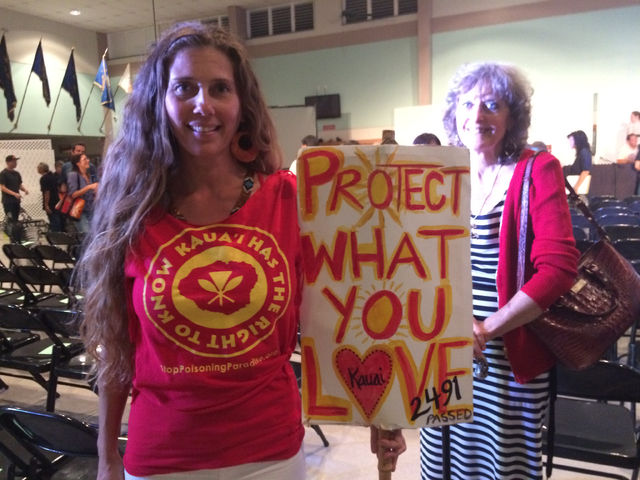LIHUE — Everyone minded their manners at the Monday night panel discussion on the affects of pesticide use on Kauai. But they didn’t all agree. With news cameras and spotlights trained on the eight-member panel that made up the Joint
LIHUE — Everyone minded their manners at the Monday night panel discussion on the affects of pesticide use on Kauai. But they didn’t all agree.
With news cameras and spotlights trained on the eight-member panel that made up the Joint Fact Finding Group, about 200 people sat in the audience at the Kauai Veterans Center. Police department were stationed at every entrance to the building.
Everyone was there for a discussion on the group’s draft report detailing the use of pesticides by agribusiness on Kauai. The draft report was released in February and the group is accepting public comment until April 8.
“The rule is civility, respect, and aloha,” said Peter Adler, with Accord3, the company that facilitated the study and the panel discussion. “We’re not on a jihad tonight, we’re here to learn and understand.”
Save for a few scattered cheers and a smattering of clapping throughout the evening, the audience complied. Though the panel members didn’t agree on everything, the discussion prevailed with an air of civility.
The panel members concluded more data would be helpful, but debated whether it is necessary and where it should come from.
“Based on the facts we have found, we need better health data,” said Sarah Stylan, member of the fact-finding group and senior research manager for Global Marker Technologies at the DuPont Pioneer Waimea Research Station. “The important thing now is to get the experts engaged, to get more scientific and more factual.”
Gary Hooser, Kauai Council member and president of the Hawaii Alliance for Progressive Action, said there’s plenty of existing data that “supports the modest request for disclosure, buffer zones, and regular testing of air, soil and water.”
Those requests are part of the draft report’s recommendations — which are still being debated within the group itself.
“If you look at the history of similar situations that occur in other parts of the country, the agrochemical industry will always contend more studies are needed and will always dispute studies that show health and environmental harm,” Hooser said.
Adam Asquith, Kauai’s extension specialist with the University of Hawaii Sea Grant College Program and a member of the fact-finding group, said he thinks there’s a need for more local data, but Kauai should be casting a wider net.
He pointed out that in order for data to be considered statistically significant, which means the data would indicate a relationship between health problems and pesticide use, there has to be a big enough sample size.
“It’s a fundamental issue of sample size. The Westside isn’t big enough,” Asquith said. “My opinion is we should look broader than our community to guide our decisions.”
Don Heacock, aquatic biologist with the Department of Land and Natural Resources, attended Monday night’s meeting and said Asquith was on point with his recommendation to gather data from the rest of the world on the effects of pesticide exposure.
“One thing that was glaringly missing from those recommendations is to bring global scientific data into the decision-making on how these biocides (pesticides) are going to be regulated,” Heacock said.
Kauai resident Mahana Dunn said in her opinion Monday’s meeting was nothing but an “unbelievable amount of bureaucratic nonsense.”
“I heard a lot of rhetoric and a lot of placating the community,” Dunn said. “It’s getting us all riled up again because we want to protect our community. We want a total ban on all of this until it has been proven safe.”
Hooser said he applauds the hard work and dedication of the group, and that the report reaffirms what “many in our community have been requesting for the past several years.”
“I am hopeful now that our community can move forward in unity to implement the report’s recommendations,” Hooser said.
The 100-page report is available online at www.accord3.com/pg1000.cfm and public comments can be submitted on the website, or by emailing jffcomments@gmail.com, through April 8.
The group is looking for feedback on specific errors on factual data and empirical evidence, and for feedback on things that have been left out of the report, that should be considered.
“This is a draft and a work in progress, and if we got things wrong, we want to know,” Adler said.


